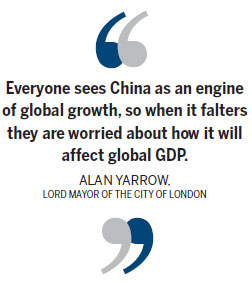China's financial markets in right direction
Updated: 2015-11-13 08:14
By Cecily Liu(China Daily Europe)
|
|||||||||||
Country on the right path to internationalization, says city of London's lord mayor
China's financial markets are on the right path for reforms, and any fluctuations along the way can only help the market become more mature, says Alan Yarrow, lord mayor of the City of London.
Although the Chinese stock market crisis this summer caused concern among international investors, Yarrow says the ups and downs of stock prices are just normal cycles in a market and that he expects such fluctuations to become less severe as the Chinese stock market develops into one that is led by long-term investors.
The Chinese stock market fell sharply in June and July, the Shanghai stock market falling 30 percent over three weeks. The attention surrounding the drop also caused concern internationally, especially as it coincided with the depreciation of the yuan in August and China's economic slowdown.
"It is perfectly normal for markets that are as young as China's to be vulnerable to volatility. The Chinese stock market is very focused on retail investors, who are driven by market momentum. The event may help China realize the importance of institutional investors who look at value rather than momentum," Yarrow says.
Yarrow was speaking to China Daily at his office in the heart of London's financial center, which itself has experienced booms and busts over the years. It was here that Yarrow hosted a visit by Chinese President Xi Jinping in October, when he conveyed Xi his views on China's financial development.
"I was saying that the most important thing to look at is the evolution of the long-term investor to be a shock absorber, as well as the growing experience of the regulators. These are important market maturity features. And the president agreed."
Yarrow, who is the 687th lord mayor of the City of London, visited China in September to promote closer UK-China financial cooperation. He led a delegation of companies from various sectors including property, banks, fund management, accountancy, insurance and law.
He visited Shenzhen, Guangzhou, Shanghai and Beijing, and met senior government representatives and regulators. Yarrow says the scrutiny of China's financial crisis demonstrates its increasing importance in the global financial system, and it is for this reason that China should adopt the mindset of a financial leader.
Such responsibility relates to the country's increasing opening up and integration into the international financial landscape, as well as the regulators' control of the market and ability to hear market participants' needs and allow industry practitioners to lead market activities.
"Everyone sees China as an engine of global growth, so when it falters they are worried about how it will affect global GDP," he says.

Yarrow says that China is waking up to its new role as an important global financial market participant because it has experienced "staggering" growth in recent years. "China's growth is incredibly well managed. Most countries, having shown the growth that China has shown, would have had bottlenecks. As China becomes more open it will have more influence on overseas markets, and that's something China needs to get used to."
One example of China's maturing stock market with reduced risks of volatility is the increasingly close price differences between the A-shares traded in China's domestic market, and the H-shares of the same stocks traded in Hong Kong's stock market.
Although the H-shares have generally lower prices compared with the A-shares, because the Hong Kong market is not driven as much by retail investor sentiment, many Chinese investors are still reluctant to buy H-shares, as this activity only became possible last year after the Hong Kong Shanghai Stock Connect was established, so such investment is still unfamiliar to many investors.
"The A-shares are higher, meaning that there is distortion in the market place, and as more funds flow through forwards and backwards between Shanghai and Hong Kong, the prices will equalize more," he says.
Historically, China's stock market was effectively closed to foreign investors. The only international investors able to access China's equity and bond markets are qualified institutional investors who have been allocated quotas.
The Shanghai Hong Kong Stock Connect has selected a certain number of stocks from one exchange to be traded on another, creating a bridge between Chinese and foreign investment opportunities.
More recently, when UK Chancellor George Osborne visited China, discussions on a possible Shanghai London Stock Connect emerged. Yarrow supports such a scheme because it would increase liquidity between different pools of capital.
As London is a center for much liquidity flowing in from other international markets, including Europe, the United States and the Middle East, such a stock market connect would allow Chinese companies to attract pools of capital otherwise unavailable to them, he says.
Like the stock connect, China is also opening up its financial market through the internationalization of the renminbi, an initiative that London's financial market practitioners have been keenly participating in by developing a range of offshore renminbi products to broaden the currency's offshore liquidity.
Yarrow says the internationalization of the renminbi is a crucial part of its financial markets opening up, and that this process is inevitable given the large amount of Chinese investment overseas.
He says the growth of Chinese institutions and investments in London is a key part of the city's drive to maintain its global competitiveness as a global financial center, because diversity is at the heart of this competitiveness.
All of China's major banks have a presence in London. The first, Bank of China, established a London office in 1929. Notable newcomers include China Construction Bank, which now plays the key role of being a renminbi clearing bank in London, as well as the Industrial and Commercial Bank of China, the world's largest bank.
Chinese insurance firms such as China Reinsurance and China Taiping Insurance are also entering London's insurance market, and Chinese law firms are expanding their presence in London to serve this outbound investment.
"London's attraction is not just the time zone. Language is important as are equality and the rule of law," he says, adding that the UK government is keen to develop an open and cooperative relationship with China, and he cites Osborne's visit to Xinjiang in September as an example.
The visit was driven by the UK's hopes of participating in China's Belt and Road Initiative, which aims to create a modern-day Silk Road Economic Belt and a 21st Century Maritime Silk Road. The region is expected to play a big part in the new trade routes with Urumqi, the provincial capital, gearing up to become a major transport and logistics hub for Central Asia as well as a center for healthcare, finance, education and culture.
Yarrow adds that in the future, as China continues to push through its reform and opens up, many opportunities will open up for British firms including British reinsurance firms' entry into China.
London is home to Lloyd's, the world's largest reinsurance market, and the growth of Lloyd's in China can greatly help China to diversify its insurance risks internationally. Despite the large market potential, the presence of Western insurance and reinsurance firms in China remains small.
But he expects this to change as Chinese regulators listen more to the needs of market participants, as they often have a better understanding of effective regulation in their niche area that facilitate efficient activities.
"Market participants can't be ignored, and it's the practitioners' responsibility to make sure the principal and spirit of regulation goes toward where the regulators cannot see," he says.
|
Chinese institutions and investments are a key part of London's drive to maintain its global competitiveness as a global financial center, says Alan Yarrow, lord mayor of the City of London. Credit |
BIO
Alan Yarrow
Lord Mayor of the City of London
Born: 1951, Johor Bahru, Malaysia
Education: Harrow
Career:
1972 joins Grieveson Grant
1981 partner, Grieveson Grant
1989 Head of UK Institutional Sales, Kleinwort Benson
1994 Managing Director, Kleinwort Benson Securities
1995 Board Member and Global Head of Equities, Kleinwort Benson
2000 Group Vice-Chairman, Dresdner Kleinwort
2001-5 Board Member, Chartered Institute for Securities & Investment (CISI)
2002-8 Chairman, Complinet
2009 Chairman, CISI
2010-14 Chairman, Kleinwort Benson Group
2010 Director, Turquoise Global Holdings and Director, Fixnetix Limited
2013 Trustee of the Police Foundation
2014 Senior Advisor, Kleinwort Benson Group
Favorite Film: Gladiator
Favorite Book: A Fine Balance, by Rohinton Mistry
Favorite Food: Welsh Salted Caramels (chocolate)
Favorite Music: Rod Stewart
cecily.liu@mail.chinadailyuk.com
( China Daily European Weekly 11/13/2015 page21)
Today's Top News
China's migrant population expected to reach 291m by 2020
China sends more currency overseas to meet demand
Little Chinese speakers hatch in UK's first bilingual nursery
China mourns death of former German chancellor
Former envoy recalls 'China hand' Helmut Schmidt
Alibaba breaks sales record on Nov 11 shopping spree
Britain's Cameron appeals to EU reform doubters
October inflation eases to 1.3%, producer prices fall again
Hot Topics
Lunar probe , China growth forecasts, Emission rules get tougher, China seen through 'colored lens', International board,
Editor's Picks

|

|

|

|

|

|







